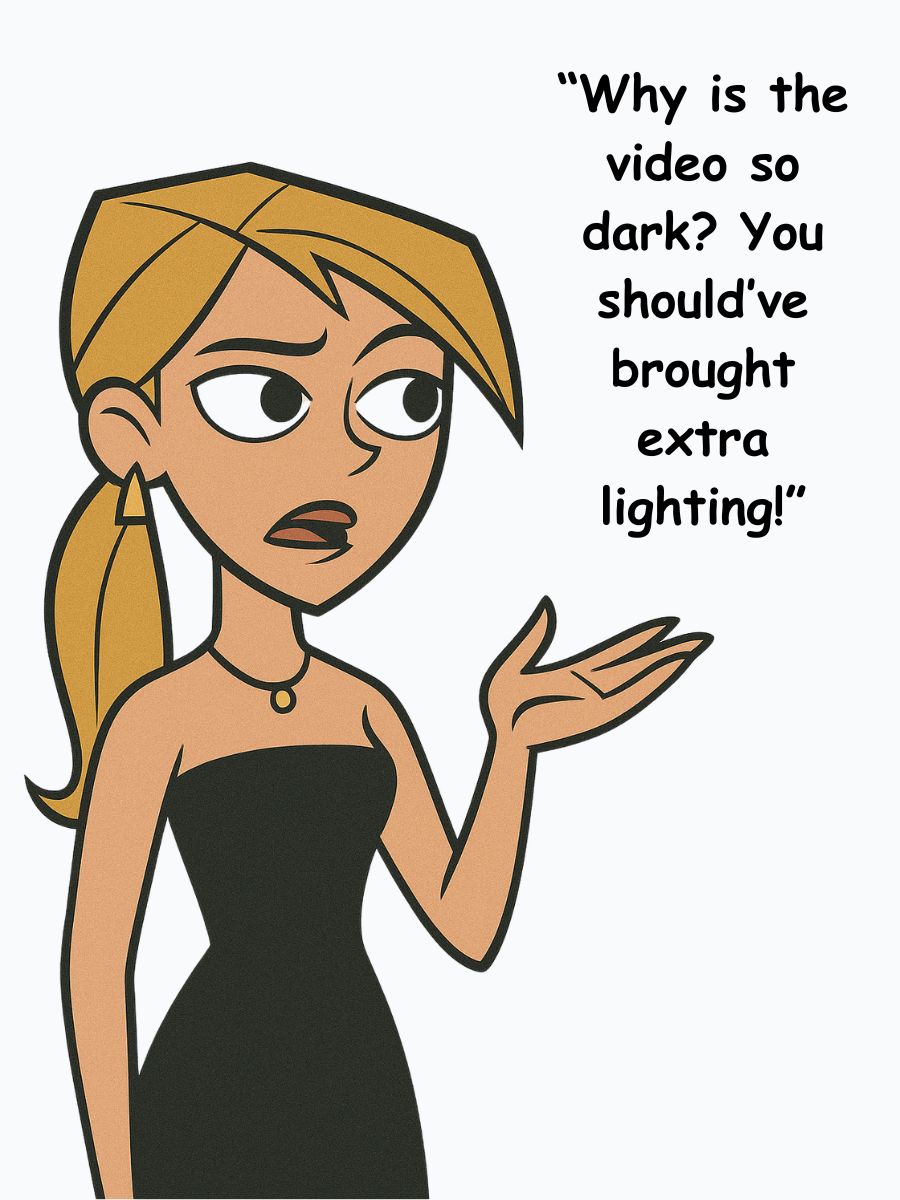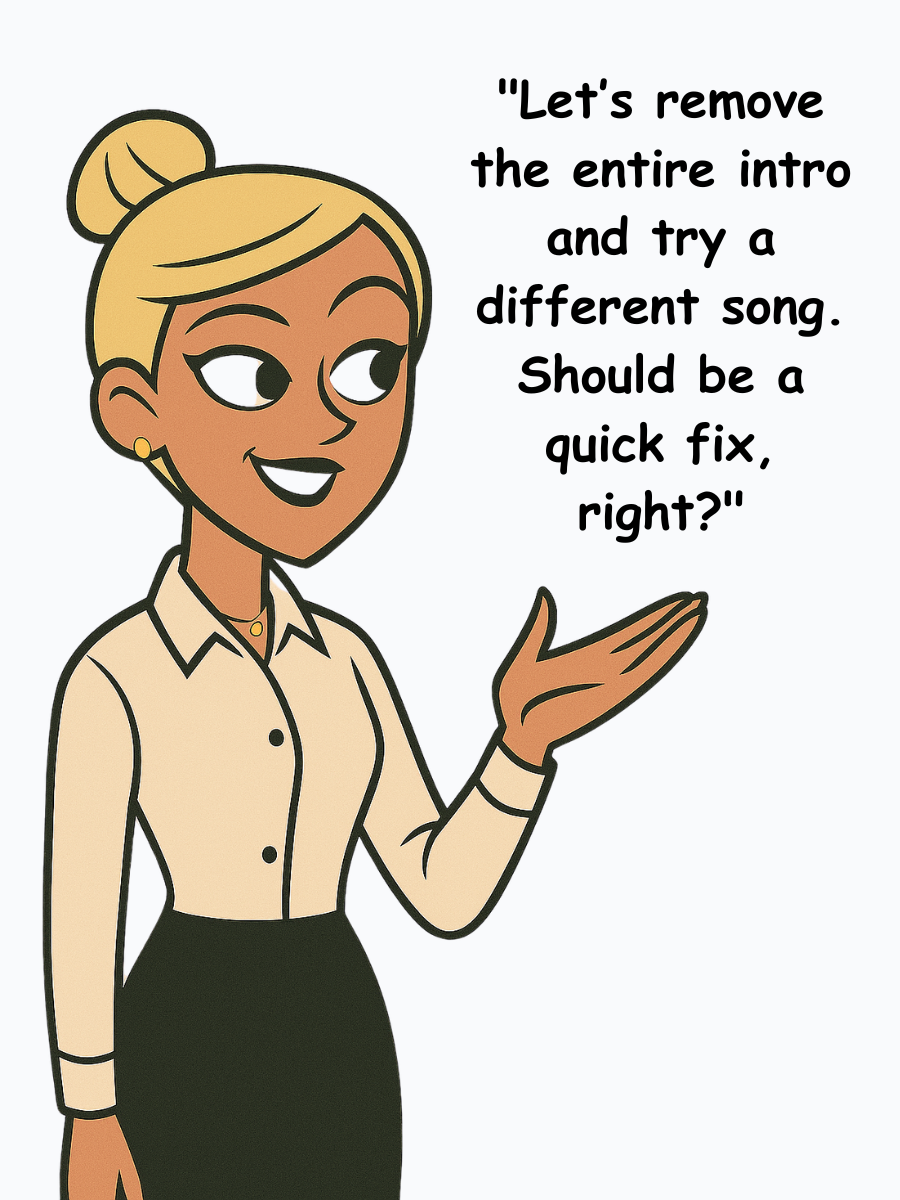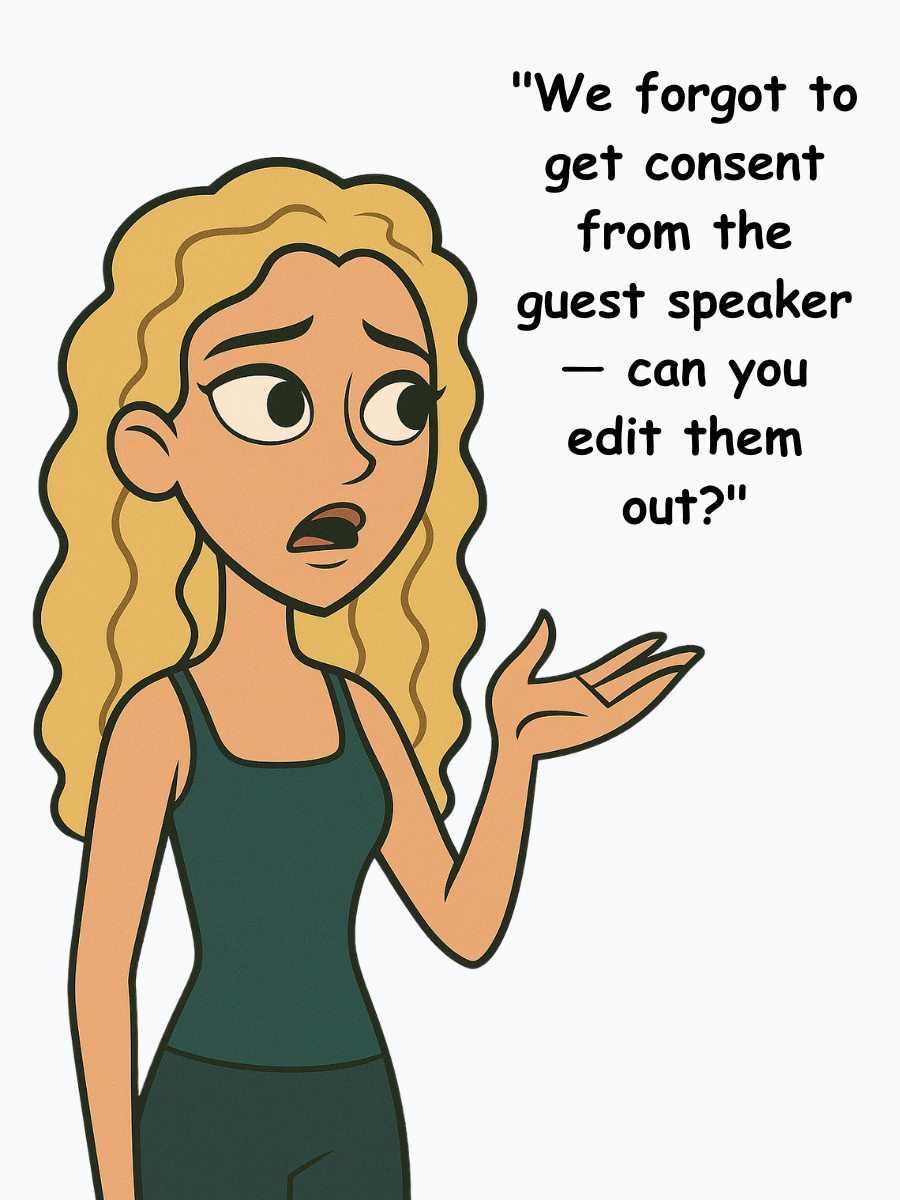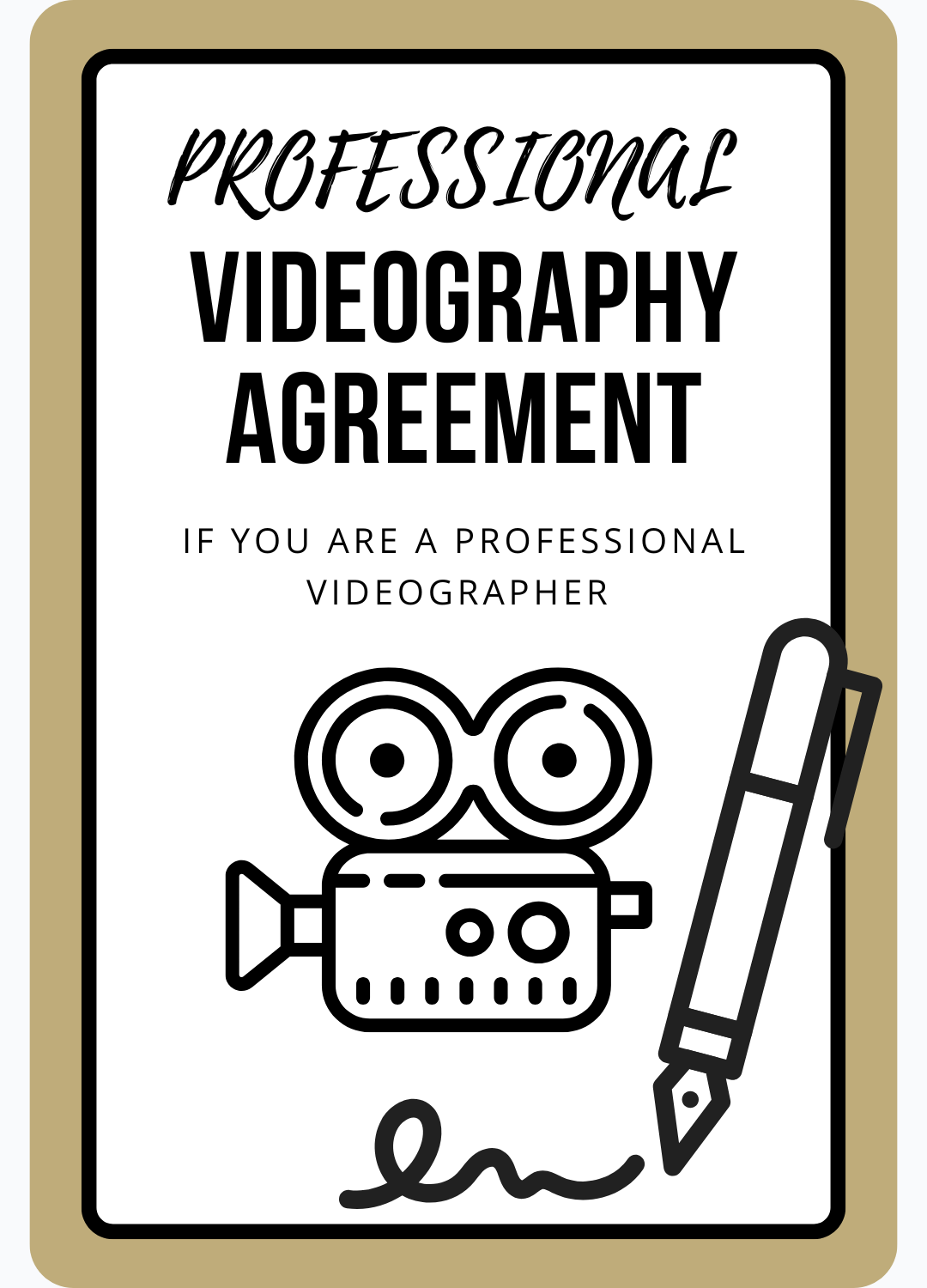9 Must-Haves for an Effective Videography Contract Template (That Most Templates Don’t Have)
Looking for a videography contract template that actually protects you? Most templates miss the most important clauses — here’s what yours must include.
As a lawyer (and creator of a videography contract template), I’ve worked with wedding, real estate, music, and commercial video pros who were burned by vague contracts that didn’t cover client cancellations, misuse of footage, or endless revision requests. I’ve seen how videographers work so hard to bring their clients’ vision to life — and how quickly things can fall apart without the right legal protection.
In this post, you’ll learn exactly what you need in your videography contract template, and we’ll get into:
Practical things that your template should include, like enforceable revision rounds, editing autonomy, clear licensing terms that the client understands, and what happens when someone does not actually work with you and makes your job harder.
Niche-specific disclaimers that your standard, simple videography contract template won’t have (even though you specifically purchased a wedding videography contract template
And what a videography contract template free of fluff should actually look like
Whether you’re filming a wedding, a brand ad, or a luxury property tour, these clauses will help you avoid scope creep, protect your income, and maintain full control over your work.
You’ll walk away knowing how to set clear boundaries, prevent legal headaches, and ensure you’re paid fairly for your time and talent — without having to chase clients or argue over what was “agreed.”
This post is all about the essentials you need in a videography contract template that works for you.
Best Videography Contract Template
The 9 Must-Haves for the Perfect Videography Contract Template Free of Fluff
1. Clear Deliverables That Leave No Room for Scope Creep
One of the most common issues that videographers in any niche face is clients who repeatedly ask for “just one more thing” — without offering more compensation.
The standard, simple videography contract template does not clearly define what you’re delivering, how many versions are included, what’s not included, and what constitutes extra work (and, thus, must be compensated accordingly).
Most templates just leave an open space for you to describe the scope yourself.
That opens the door to unpaid revisions, extra filming days, or having to provide different formats without extra pay.
Here’s how my videography contract template solves this issue (and what you need in yours). The contract should clearly break down:
The number and type of videos (e.g., 3 x 1-minute reels)
The format and duration of each Deliverable
What’s included in your service (like on-site filming, revisions, consultations)
What’s not included — like writing scripts, sourcing music, subtitles, or editing extra clips
A scope creep clause that lets you (1) decide whether you even want to do extra work for that client and (2) charge extra if the client requests work beyond the original agreement
With this structure, you’re legally protected to say:
“That’s not included.”
“Happy to do that — here’s the extra fee.”
You don’t need to guess what’s fair or fight with a client over whether something was agreed on. Your boundaries are all in writing.
Want a template that sets these boundaries for you?
Get the Videography Contract Template →
2. Disclaimers That Actually Fit Your Niche
If your videography contract template only includes a basic “we’re not liable” sentence, you’re leaving yourself wide open to major liability risks.
Generic templates often copy and paste a single liability clause that barely scratches the surface.
But if you shoot weddings, music videos, real estate walkthroughs, or corporate promos — you face very different risks.
That’s why your videography contract template should include niche-specific disclaimers tailored to your type of shoot.
My videography contract template includes all the disclaimers any videographer could need that you can customize depending on your project or niche, like the following:
Weather disclaimer — so you’re not liable if rain ruins an outdoor wedding shoot
Guest behavior disclaimer — in case someone steps in front of the camera or causes a disruption
Venue limitation disclaimer — covering access restrictions, poor lighting, or last-minute rule changes
Equipment disclaimer — protecting you from paying for damage caused by clients or guests
Editing + results disclaimer — so you’re not blamed for subjective creative preferences or marketing results
Drone disclaimer — clarifying you’re not responsible if drone use is restricted by law or unsafe to operate
Storage & backup disclaimer — to set expectations around file retention, data loss, or security risks
It also includes niche-specific dsclaimers, which you can add or remove to customize it specifically to your niche or project. For example:
Wedding videographer? Keep the guest behavior, weather, and venue disclaimers, so you have a wedding videography contract template that protects you against all the risks in your specific niche.
Real estate videographer? Use the staging, property access, and drone disclaimers.
Commercial videographer? Focus on faulty products, compliance, and model release disclaimers.
You can learn more about all the disclaimers you need in your videography contract template in my blog post on the 21 Videographer Disclaimer Essentials for the Top 5 Videography Niches to Protect Videographers.
3. Enforceable Cancellation & Rescheduling Clauses
Now, let’s talk cancellation and rescheduling.
Most templates will include a cancellation and rescheduling policy.
However, the two main issues with the average, simple videography contract template are these:
It has a standard policy that’s not fully customizable to your boundaries.
And it’s usually very vague about what the actual consequences are.
They’re often written so vaguely that they won’t hold up if challenged.
Here’s how my videography contract template works and what you need in yours:
Cancellation clause that lets you keep the deposit if the client cancels late, and you decide how many hours’ notice counts as “late”)
Rescheduling limits — you can allow one free reschedule, charge a fee for last-minute changes, or block rescheduling entirely
Clear consequences — if the client doesn’t show up or delays the shoot, they don’t get a refund
Videographer cancellation clause — protects you too, by limiting your liability to just refunding the deposit if you need to cancel
And it goes further — if a shoot can’t go forward due to reasons outside your control (like a venue issue or no-show), the client still owes you. No more losing your weekend and your paycheck because a client “forgot to tell Aunt Lisa.”
You also have the option to charge an admin fee for refunds and make sure you’re covered if they’ve violated other terms (like late payment).
It’s one thing to say “no refunds” — it’s another to have it spelled out in a legally binding contract.
Want a fully customizable cancellation and rescheduling policy that is fully customizable and includes the enforceable language you need?
Get the Videography Contract Template →
4. A Clause That Stops the Endless Revision Cycle
One of the most exhausting (and unpaid) parts of being a videographer? Revisions. I hear you. Say no more.
The issue with the average, simple videography contract template is that it typically includes a vague line about revisions — but never defines how many, what constitutes a “revision,” or what happens when the limit is exceeded.
My videography contract template ends the endless revision cycle by:
Setting a clear number of revision rounds (you choose how many — usually 1 or 2)
Requiring timely feedback within a set number of days
Defining what counts as a valid revision (no major changes from the original brief!)
Charging extra for out-of-scope edits or late revision requests
Restricting access to drafts — so clients can’t download or misuse your unfinished work (and that’s actually spelled out in my videography contract template. Try finding that clause in another template.).
And even better: if the client ghosted and didn’t give feedback within the revision window? The draft is automatically considered approved. This is the one crucial thing that so many templates miss!
That means no more chasing feedback or wondering if you’re stuck in revision limbo forever.
Want a videography contract template free of fluff that actually spells this all out for you?
Get the Videography Contract Template →
5. Usage Rights That You Control
Now that the video has been filmed, edited, and delivered to the client, what can the client do with it?
Most generic templates will include two generic alternatives:
Either you assign all rights to the video, so the client becomes the owner and can do whatever they want with it. Resell it even.
Or you remain the owner of the video content and license it to the client.
However, most templates don’t let you specify exactly what the client can do with the video if they receive a license.
But does the client receive a license to:
Use it in social media?
Use it in ads?
Use it wherever they want?
Cut it into new videos?
Sublicense it to someone else or another company?
So, you don’t even know what the client will do with your footage.
Your videography contract template should give you full control with crystal-clear options for:
Ownership: Do you keep full rights and grant a license? Or transfer ownership for a higher fee? You decide.
License type: Choose from non-exclusive, exclusive, or sole licenses — each with a legal explanation built right in.
Usage limits: Restrict usage to a specific platform, purpose (organic use only or also ads?), and time period
Editing rights: Ban clients from altering, remixing, or cropping your work without written permission
Paid upgrades: If the client wants additional rights or full ownership later, you get to charge for it
You can even add a clause that revokes the license if the client doesn’t pay you (on time).
My videography contract template is built to protect your rights from day one — while still being flexible when you want to license or upsell:
Get the Videography Contract Template →
6. Payment Flexibility + Late Fee Protection
Most templates either (1) don’t mention payment timelines at all, (2) require full payment after the shoot (which is risky), or (3) fail to include any consequences for non-payment.
Here’s how my videography contract template protects your cash flow:
Deposit clause — so you’re not booking out your calendar without upfront payment
Flexible structure — use full payment up front, milestone payments, or royalties depending on your business model
Release after payment — the client only has the right to actually receive the MP4 after full payment is made, so you never run the risk of actually delivering the video without getting paid
Revocation clause — if you are charging monthly royalties and the client doesn’t pay, you legally revoke their usage rights until payment is made in full
Late fee clause — lets you charge late fees (to the extent permitted in your state and country) if a client doesn’t pay on time
No awkward follow-ups. No unpaid work.
You’re not just an artist — you’re a business. And your videography contract should treat you like one.
Want to get paid on time and avoid disputes?
Get the Videography Contract Template →
7. Withholding Release Until Payment
Have you ever delivered the first draft in MP4 format to the client — only to find out that they downloaded it, posted it, or started using it in ads before giving feedback (or paying the final invoice)?
Well, don’t be embarrassed if that has happened to you, as this has happened to (too) many videographers.
Most generic videography contracts do not even contain practical clauses that ensure the video is not actually delivered to the client until they’ve paid.
My videography contract template protects your drafts with one of the most overlooked (but powerful) clauses:
Drafts must be delivered via a non-downloadable or restricted-access platform of your choice — and the client has no right to download, edit, or use those drafts until final approval and full payment.
What that means for you:
You stay in control of how drafts are shared (e.g., Frame.io, Vimeo with password protection, or even Google Drive with download restrictions)
Clients can’t download or repurpose your draft without permission
Review access ≠ usage rights — you’re not granting any license just by letting them view the draft
You’re protected if a client tries to “skip” the final payment by using a preview version
And make sure that, in practice, you only share your drafts with your client through a program that does not allow the client to download your videos.
You don’t want the client to use your videos before they are finalized (and you haven’t been paid for their use).
This clause ensures that this is a right that you can enforce, and the client can’t demand to receive the MP4 files instead.
So, you only hand over the final files after you’ve been paid — and on your terms.
Want a practical videography contract template that protects your drafts, prevents misuse, and sets clear delivery boundaries from the start?
Get the Videography Contract Template →
8. Clauses to Protect You From Third-Party Issues
You’ve probably had at least one shoot where something went wrong because of someone or something you couldn’t control.
For example:
A drunk wedding guest blocked your shot
The venue restricted access
A participant refused to be on camera
Hair and makeup did not show up
The property is not prepped for filming
If your videographer contract doesn’t explicitly protect you from those third-party issues:
Shooting might be rescheduled, and the client does not even compensate you for the extra time and effort required from you to show up another time.
Filming might have to be cancelled altogether at that moment, and you’re not even compensated for that, or the client demands a refund of the deposit paid.
You could even be held liable — even when it’s clearly not your fault.
My videography contract template includes 10+ disclaimers and indemnities that shield you from problems relating specifically to third-party issues like:
Guest behavior — you’re not liable if someone disrupts the shoot or causes bad footage
Property access — if you’re locked out, you’re not responsible for missed coverage or delays
Venue limitations — protects you when you can’t shoot in certain areas or have to deal with poor lighting, sound, or space
Lack of consent — puts the burden on the client to get signed releases and legal permission for everyone being filmed
Third-party IP — you’re not liable if the client includes copyrighted music, logos, or artwork without permission
Permit issues — the client is responsible for securing filming permits — not you
Timing disclaimers — you’re not on the hook if coverage is incomplete because the event ran over
It even covers:
Drone usage limits based on local laws and weather conditions
Brand or product reputation risks if your content is later criticized
Regulatory compliance (so you’re not liable for ad rules, FTC violations, or privacy laws)
Most templates barely include one general disclaimer — let alone 13+ specific, legally enforceable clauses like these.
Want to stop worrying about guest drama, venue chaos, or IP claims from random third parties?
Get the Videography Contract Template →
9. Real Editing Autonomy (and Protections if You’re Blamed)
Your clients hire you over other videographers for your unique videography style and expertise. However, some clients will still try to micromanage how you edit videos, like color grading.
But you are the creative they hired, so you should be making the creative calls.
You not only need to make this clear to your client, but your videography contract should give you that full creative discretion.
However, most generic contract templates won’t even mention editing discretion, let alone offer legal protection when clients are unhappy with the final result.
My videography contract template gives you full creative autonomy and shields you from blame with these key clauses:
Editing discretion clause — you retain sole control over final edits, color grading, and stylistic decisions
Errors & omissions disclaimer — protects you from re-edit requests over tiny things (like minor typos or a shot they changed their mind about)
Results disclaimer — clarifies that you don’t guarantee specific outcomes (like engagement rates or ROI from marketing videos)
Optional re-edit policy — if you choose to make further changes, you set the fee and scope
It even says that the videographer is not liable for delays in delivery or poor-quality footage resulting from:
Client’s failure to prepare or cooperate
Venue or weather limitations
Technical errors outside your control
And just in case a client tries to pressure you into changes by withholding payment? The withholding release clause (see paragraph 7) and the IP section (see paragraph 5) already have your back.
These clauses protect your creative freedom, your workflow, and your business — so you don’t waste time doing endless unpaid tweaks or defending your choices.
Want legal protection that keeps your editing process yours — and limits the client’s ability to push back?
Get the Videography Contract Template →
The Ultimate Event, Music, Commercial, Real Estate, and Wedding Videography Contract Template
Whether you’re filming weddings, real estate tours, music videos, or branded content — you need a contract that actually protects your time, your footage, and your creative rights.
Most templates leave you exposed:
🚫 No clear deliverables
🚫 No cancellation policies
🚫 No usage rights or IP protections
🚫 No disclaimers for guest behavior, venue issues, or tech problems
🚫 No limits on revisions or raw footage requests
My videography contract template has it all:
✅ 21 built-in niche-specific disclaimers
✅ Customizable for different types of shoots
✅ Clear deliverables, timelines, and payment terms
✅ Legally enforceable usage rights you control
✅ Boundaries for revisions, file delivery, and client misuse
✅ Designed to help you avoid legal disputes before they happen
Created by a lawyer for creatives (that’s me!) — and knows exactly where videography contracts usually fall short.
Ready to protect your work and get paid fairly?
Get the Videography Contract Template →
This post was all about the essentials you need in your videography contract template to protect your rights, your creativity, and your autonomy.
Want to learn more about everything you need in your videography contract template? Read these blog posts next:





